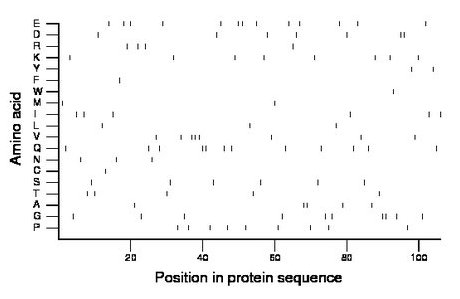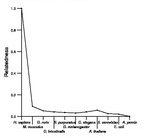
| Name: LOC100289968 | Sequence: fasta or formatted (106aa) | NCBI GI: 239750353 | |
|
Description: PREDICTED: hypothetical protein XP_002347379
| Not currently referenced in the text | ||
|
Composition:

Amino acid Percentage Count Longest homopolymer A alanine 4.7 5 2 C cysteine 0.9 1 1 D aspartate 6.6 7 2 E glutamate 12.3 13 2 F phenylalanine 0.9 1 1 G glycine 9.4 10 2 H histidine 0.0 0 0 I isoleucine 5.7 6 1 K lysine 7.5 8 1 L leucine 2.8 3 1 M methionine 1.9 2 1 N asparagine 2.8 3 1 P proline 8.5 9 1 Q glutamine 11.3 12 2 R arginine 3.8 4 1 S serine 5.7 6 1 T threonine 4.7 5 1 V valine 7.5 8 3 W tryptophan 0.9 1 1 Y tyrosine 1.9 2 1 |
Comparative genomics:
Search single species RefSeq proteins at NCBI
Search summary 
Figure data | ||
Related human proteins:Protein Relative score Description Self-match 1.000 PREDICTED: hypothetical protein XP_002347379 LOC100292840 1.000 PREDICTED: similar to XAGE-3 protein LOC100289417 1.000 PREDICTED: hypothetical protein XP_002343217 PAGE3 0.285 P antigen family, member 3 (prostate associated) [Ho... XAGE3 0.275 XAGE-3 protein XAGE3 0.275 XAGE-3 protein XAGE5 0.254 X antigen family, member 5 PAGE5 0.233 P antigen family, member 5 isoform 1 PAGE5 0.228 P antigen family, member 5 isoform 2 PAGE2B 0.223 P antigen family, member 2B PAGE2 0.218 P antigen family, member 2 XAGE2B 0.161 X antigen family, member 2-like XAGE2 0.161 XAGE-2 protein PAGE1 0.150 P antigen family, member 1 GAGE10 0.135 G antigen 10 PIWIL1 0.124 piwi-like 1 PAGE4 0.114 G antigen, family C, 1 GAGE2D 0.104 G antigen 2D GAGE8 0.104 G antigen 8 GAGE13 0.104 G antigen 13 GAGE2E 0.104 G antigen 2E GAGE6 0.104 G antigen 6 GAGE5 0.104 G antigen 5 GAGE4 0.104 G antigen 4 GAGE1 0.104 G antigen 1 isoform 2 GAGE1 0.104 G antigen 1 isoform 1 GAGE12J 0.104 G antigen 12J GAGE2A 0.093 G antigen 2A GAGE2B 0.093 G antigen 2B GAGE2C 0.093 G antigen 2Human BLASTP results (used to prepare the table) | |||
Gene descriptions are from NCBI RefSeq. Search results were obtained with NCBI BLAST and RefSeq entries. When identical proteins are present, the self-match may not be listed first in BLASTP output. In such cases, the table above has been reordered to place it first.
See About the Figures for the scoring system used in the figure above right. The same scoring system was used in the table of BLASTP results.
Guide to the Human Genome
Copyright © 2010 by Stewart Scherer. All rights reserved.
